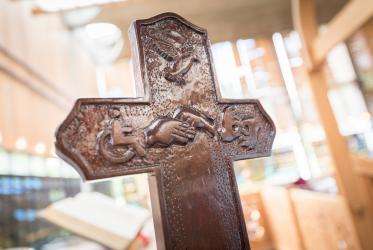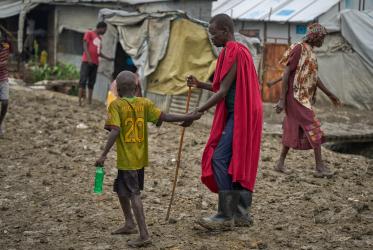More articles and free photos at
Up to 60 people gathered for the pre-Assembly meetings of the Ecumenical Disability Advocates Network (EDAN) in Porto Alegre. Held from February 11-13, the meetings drew together people with personal experience of disability for discussion and reflection.
Participants stressed the importance of what was being undertaken in the ecumenical field. Samuel Kabue, who administers EDAN for the WCC, referred to the need for inclusivity, saying: "Disabled people need to be part of ministry, not just to be ministered to. Some people regard a disabled person as someone to be cared for, not to care for others." Another participant, Gordon Earl Cowans, said "Disability is not an issue in a box, it cuts across all aspects of the lives of people across the world. Globalization, poverty and injustice are all on our radar screen." He added that there was a need to understand that a person with disabilities was part of God’s gift to the world.
Each day began with Bible study and prayer, and continued with a programme of addresses and open discussion. The meetings had three themes - disability and globalization, bio-ethics and disability, and disability and violence.
Papers included one by Rogate Mshana, WCC programme executive for economic justice, who spoke of the AGAPE document due to be considered by the WCC – Alternative Globalization Addressing People and Earth - and its relation to people with disabilities. Bioethics and disability was addressed by Gregor Wolbring of the University of Calgary, Canada, who spoke of disability as a social construct.
"Sexual Violence on Women with Disabilities," was the topic for YeJa Lee, director of Korea Differently Abled Women United (KDAWU), which since 1999 has opened eight counselling centres and three shelters. In her paper she said that the issue was hidden in Korean society, in part because Koreans had historically been intolerant towards "differently abled" people. A paper from Rev. John Naudé dealt with the abuse of disabled children, noting that while such abuse had only recently been recognized, in fact children with disabilities were particularly vulnerable.
During the Assembly itself, EDAN will host a three-session ecumenical conversation entitled "A church of all and for all" reflecting on the interim statement of that name presented to the WCC central committee in 2003. Among other insights, it said, "There has been a growing awareness in some churches that persons with disabilities invite the church to explore anew the understanding of the gospel and the nature of the church."
Two mutirão sessions will offer Assembly participants the chance to enhance their understanding of EDAN's work in relation to the Assembly theme.
The EDAN network was set up in the wake of the 1998 WCC Assembly, and operates from Kenya under the auspices of the All Africa Conference of Churches. It engages in theological reflection on disability, and advises the WCC on its work to improve conditions affecting disabled people in the churches globally. EDAN produces a quarterly newsletter, and organizes regional conferences in different parts of the world.
Assembly website:www.wcc-assembly.info






